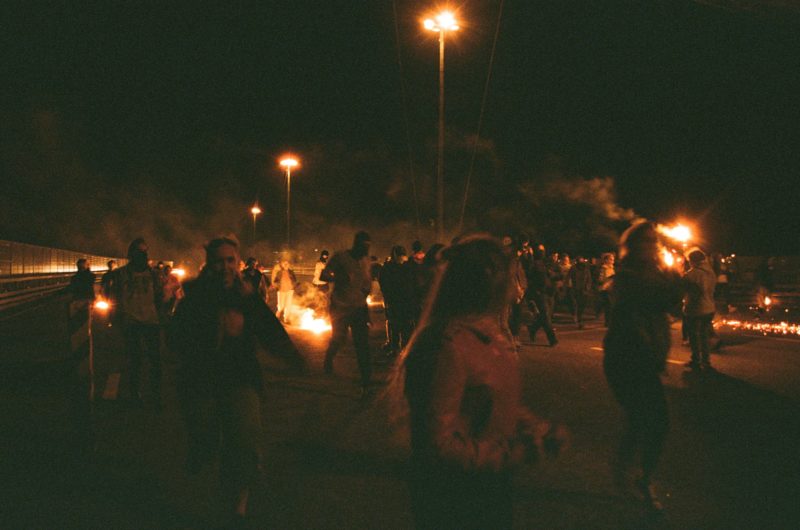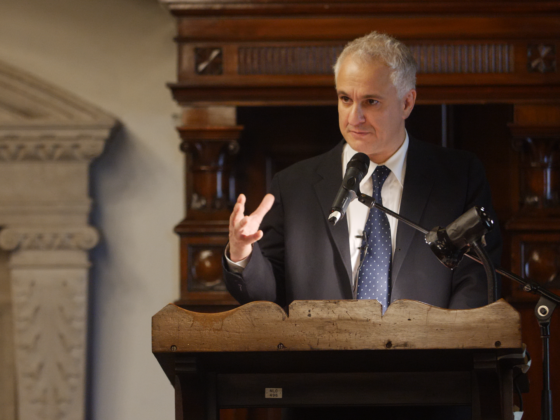by
When activists resort to force, their tactics are commonly described as “mistaken,” “ineffective,” or “counterproductive.” But too often, such criticisms miss the point. Not every activist is trying to win over new adherents. Some are less interested in changing minds than in breaking wills. So to advance their cause, they employ the methods of coercion. (Examples of this fanaticism can be found here, here, and here.)
Fear has its uses. If you listen to radicals on the left, they will tell you so. Consider a 2014 piece published by Salon that defended the physical harassment of Google employees. Direct action of this kind, Natasha Lennard argued, can get results:
Intimidation tactics targeting the employees of major corporations are nothing new and have a history of success: Indeed, animal rights activists achieved some major victories in securing the closure of animal testing facilities in the ’90s and early 2000s through the intimidation of key investors. This intimidation was deemed terrorism, but, hey, it worked.
Lennard was referring in part to the campaign against Huntingdon Life Sciences (for background, see here, here, and here). This campaign was dismissed by some at the time as an anomaly. But looking back now, its ethos of “by any means necessary” no longer seems so unusual.
Abusive behavior by radicals should come as no surprise. Activists for social justice are not so different from other political actors. They test the limits of what they can get away with doing. And the more their transgressions are indulged and even celebrated, the bolder they will become. They will give us more of what we reward and less of what we punish.
Granted, there are risks to being less than peaceful. (A movement would do well to keep any goons at one remove from its spokespeople.) But Lennard had a point about diversified tactics. A bit of violence can do something for a movement. When it works, it adds a hint of menace to activist demands. It implies a penalty for obstructing their version of justice. It compels people to yield.
The real trouble with activist violence has less to do with efficacy than with democracy. This was ably explained by Sidney Hook, in his 1967 essay “Democracy and Social Protest: Neither Blind Obedience nor Uncivil Disobedience.” Citizens in a free society, Hook argued, should be “free to disagree with a law but that so long as it remains in force they have a prima facie obligation to obey it.” The burden should remain on protesters to justify their actions to their fellow citizens. There should be a presumption against illegal acts of coercion.
This arrangement is necessary, Hook said, to “escape the twin evils of tyranny and anarchy. Tyranny is avoided by virtue of the freedom and power of dissent to win the uncoerced consent of the community. Anarchy is avoided by reliance on due process, the recognition that there is a right way to correct a wrong, and a wrong way to secure a right.” Activists must be denied the means of political extortion. Otherwise, liberal democracy would not be viable.
The freedom to protest is essential for democratic consent, and it must be protected from undue interference. Disobeying the law can also serve a legitimate purpose, if the act of defiance is both non-violent and has a principled justification. All of this Hook acknowledged. The problem is not honest and peaceful dissent. It is the tendency of some liberals to fixate on one evil to the exclusion of another. Hook criticized “ritualistic liberals,” not because they rejected “the absolutism of law,” but because they demanded “something very close to the absolutism of individual conscience.”
Properly rejecting the view that the law, no matter how unjust, must be obeyed in all circumstances, they have taken the view that the law is to be obeyed only when the individual deems it just or when it does not outrage his [or her] conscience. Fantastic comparisons are made between those who do not act on the dictates of their conscience and those who accepted and obeyed Hitler’s laws. These comparisons completely disregard the systems of law involved, the presence of alternatives of action, the differences in the behavior commanded, in degrees of complicity of guilt, in the moral costs and personal consequences of compliance, and other relevant matters.
It is commendable to recognize the primacy of morality to law, but unless we recognize the centrality of intelligence to morality we stumble with blind self-righteousness into moral disaster. Because, Kant to the contrary notwithstanding, it is not wrong sometimes to lie to save a human life, because it is not wrong sometimes to kill in defense to save many more from being killed, it does not follow that the moral principles: “Do not lie!” “Do not kill!” are invalid. When more than one valid principle bears on a problem of moral experience, the very fact of their conflict means that not all of them can hold unqualifiedly. One of them must be denied. The point is that such negation or violation entails upon us the obligation of justifying it, and moral justification is a matter of reasons not of conscience. The burden of proof rests on the person violating the rules. Normally, we don’t have to justify telling the truth. We do have to justify not telling the truth. Similarly, with respect to the moral obligation of a democrat who breaches his political obligation to obey the laws of a democratic community. The resort to conscience is not enough. There must always be reasonable justification.
Indignation is not enough, no matter how righteous it may seem. Activists who break the law owe the rest of us more than outrage. When one hears the voice of conscience, Hook said, one “is hearing not the voice of God, but the voice of a finite, limited” mortal. This inner voice “is neither a special nor an infallible organ of apprehending moral truth.” Conscience must “cap the process of critical reflective morality,” lest it become prejudice masquerading as a divine revelation.
In a liberal democracy, grievance is not license. It does not entitle an activist to get their way, by hook or by crook. But many activists on the left in the late 1960s chafed at this civic restraint. They viewed American society as fundamentally oppressive. They claimed to be fighting for real democracy, which could not be achieved by remaining peaceful. Democracy for them was only real when it granted their demands. Hook said of their conceit:
The rules of the game exist to enable them to win and if they lose that’s sufficient proof that the game is rigged and dishonest. The sincerity with which the position is held is no evidence whatsoever of its coherence. [….] The right of petition gives one a chance to persuade, and the persuasion must rest on the power of words, on the effective appeal to emotion, sympathy, reason, and logic. Petitions are weapons of criticism, and their failure does not justify appeal to the criticism of weapons. Some groups that have resorted both to civil and uncivil disobedience justify themselves by claiming that the authorities did not listen to their demands on the ground that their demands were not granted. This begs all questions about the legitimacy and the cogency of the demands.
The absurdity of this position is much easier to see when it is taken by one’s opponents. For example, most liberals condemn activist violence on the right without equivocation. Few of us indulge the self-proclaimed “patriot” militias who threaten to use any means necessary to achieve their ends. We are not eager to make excuses for violent mobs of white supremacists who march to intimidate their enemies. We do not pretend that activists who bomb abortion clinics are compelled to act by some intolerable pressure. Their counterparts on the left are no better, and they should not be held to a different standard.
A free society requires peace. It requires a way of living and arguing with political rivals without kicking them in the teeth. Those who would undermine this arrangement should not be mistaken for heroes. They are not liberals in a hurry. They are pop-up tyrants who improvise for lack of a state.
This article was originally published at Liberal Nomad.













5 comments
Excellent. Closing paragraph is so spot on!
I may have finally found something from New Discourses that I disagree with. I agree that, regardless of its effectiveness, violent resistance is not justified. But I’m confused about your position on unjust laws. I side with Mahatma Gandhi and Martin Luther King, Jr.: it is your duty to defy an unjust law. Is that the stance you take in this article?
A reference source::
https://billofrightsinstitute.org/educate/educator-resources/civil-disobedience/
Jordan- I believe that is clarified in this statement from the article:
“Disobeying the law can also serve a legitimate purpose, if the act of defiance is both non-violent and has a principled justification. All of this Hook acknowledged. The problem is not honest and peaceful dissent.”
The main point not being the absolute supremacy of all law, but that in order for Democracy to function “follow the law” must be as much of a moral obligation as “do not kill”. There may be circumstances where killing is necessary (self defense) but it always comes with a requirement to justify the action. It may be necessary to break the law, but it is a burden of the protestors to defend that decision to society and to allow society to judge the evidence.
Jordan, civil disobedience, has nothing to do with intimidating with the brute force of the mob and by such means violating the property or personal liberty of the target.
Thanks for the thought-provoking argument.
It reminded me of a colleague, who a few years ago gave a speech before the whole school, where she confessed that twenty years ago, a relative of hers, who worked for the city school system, falsified her application so she could gain entry to the gifted and talented program as a child. This “confession” quickly turned into a defense of this relative’s actions, and a self-righteous castigation of the “systems of oppression” that made such a criminal act necessary.
In the end, students and teachers congratulated her on her bravery for talking about her personal experience.
Not a single mention was made of the other child who’s place in the program she supplanted.